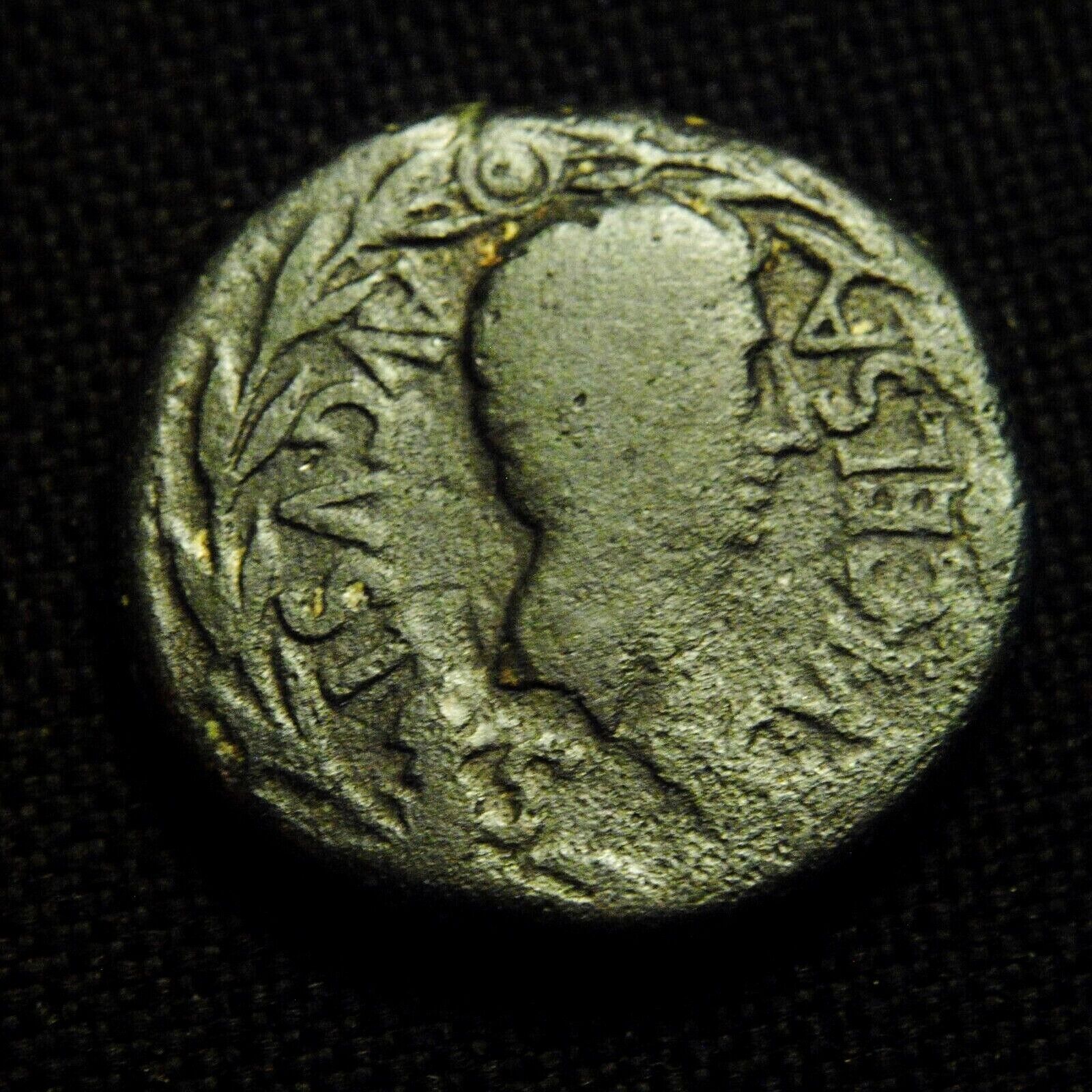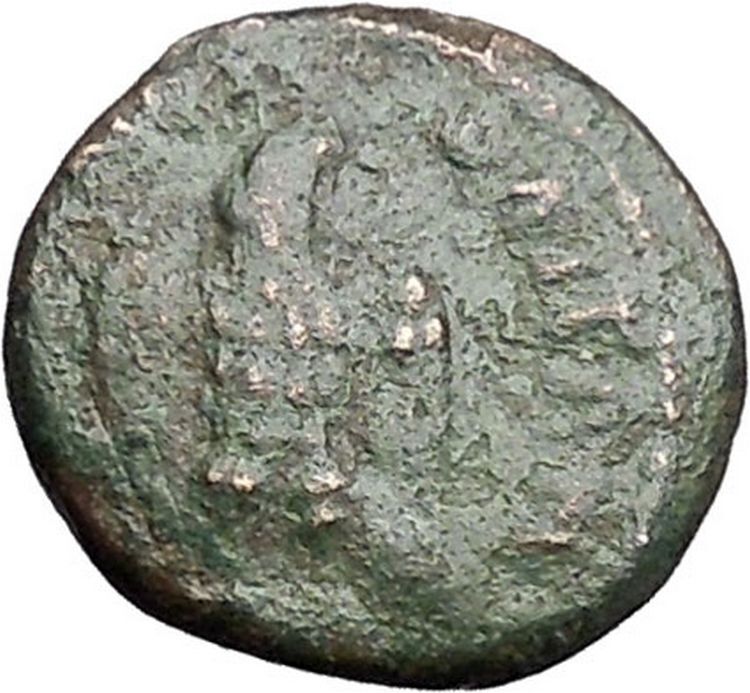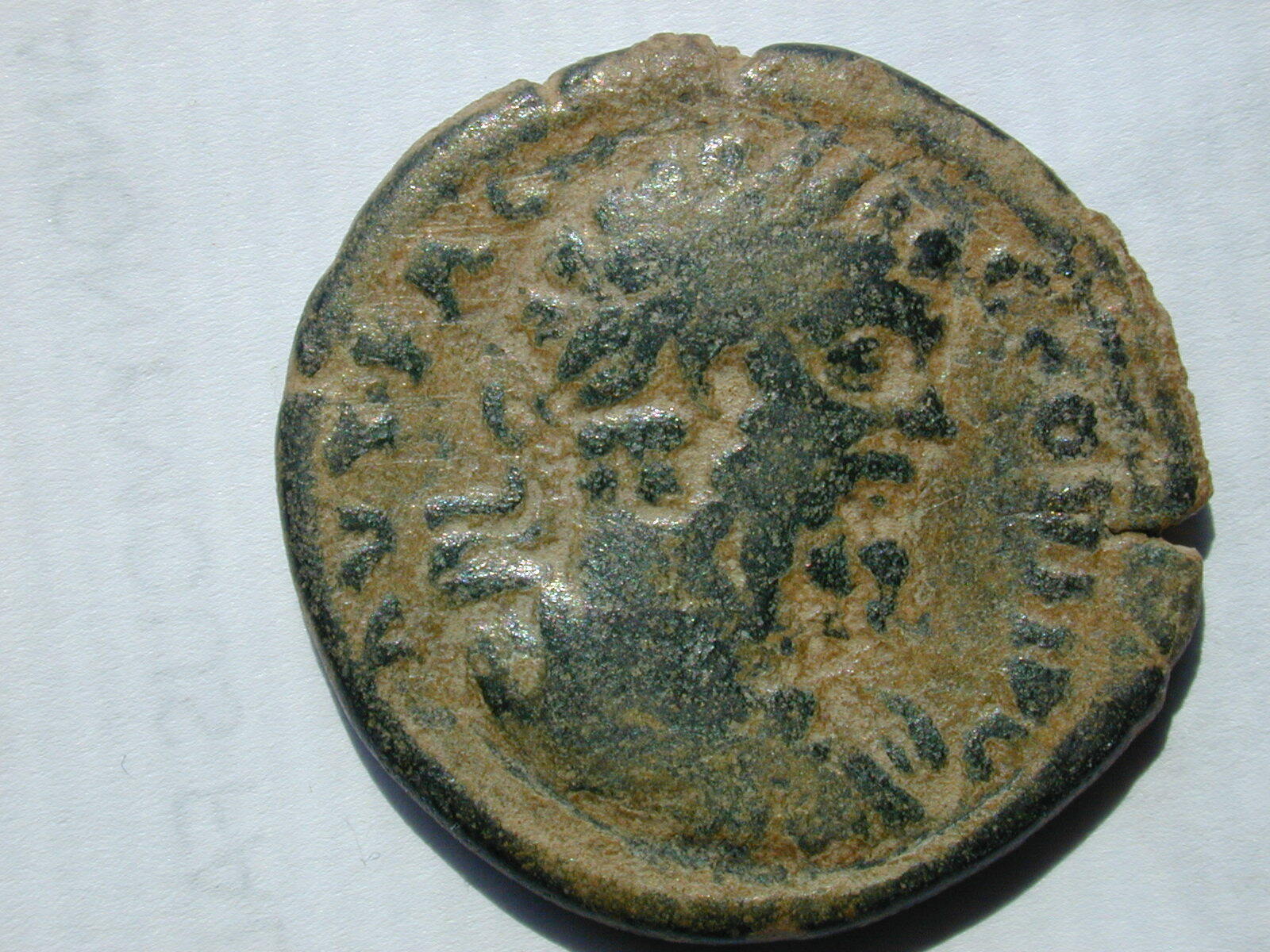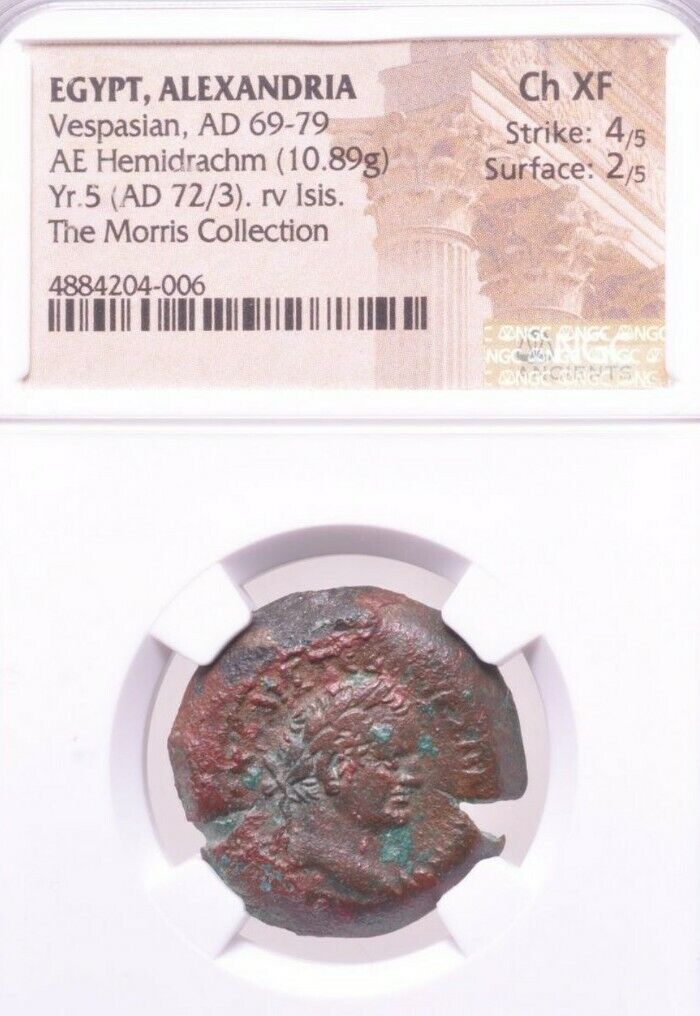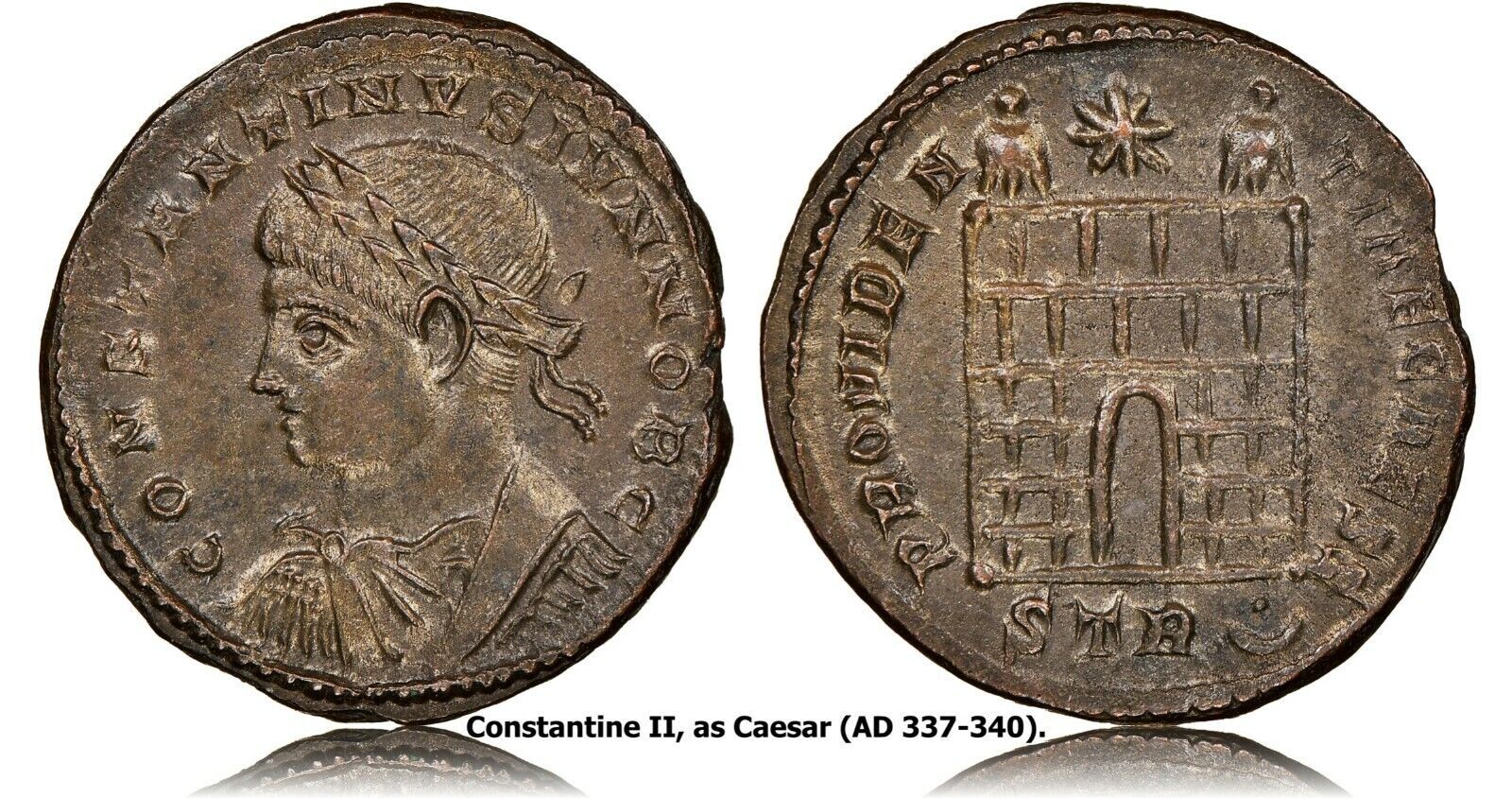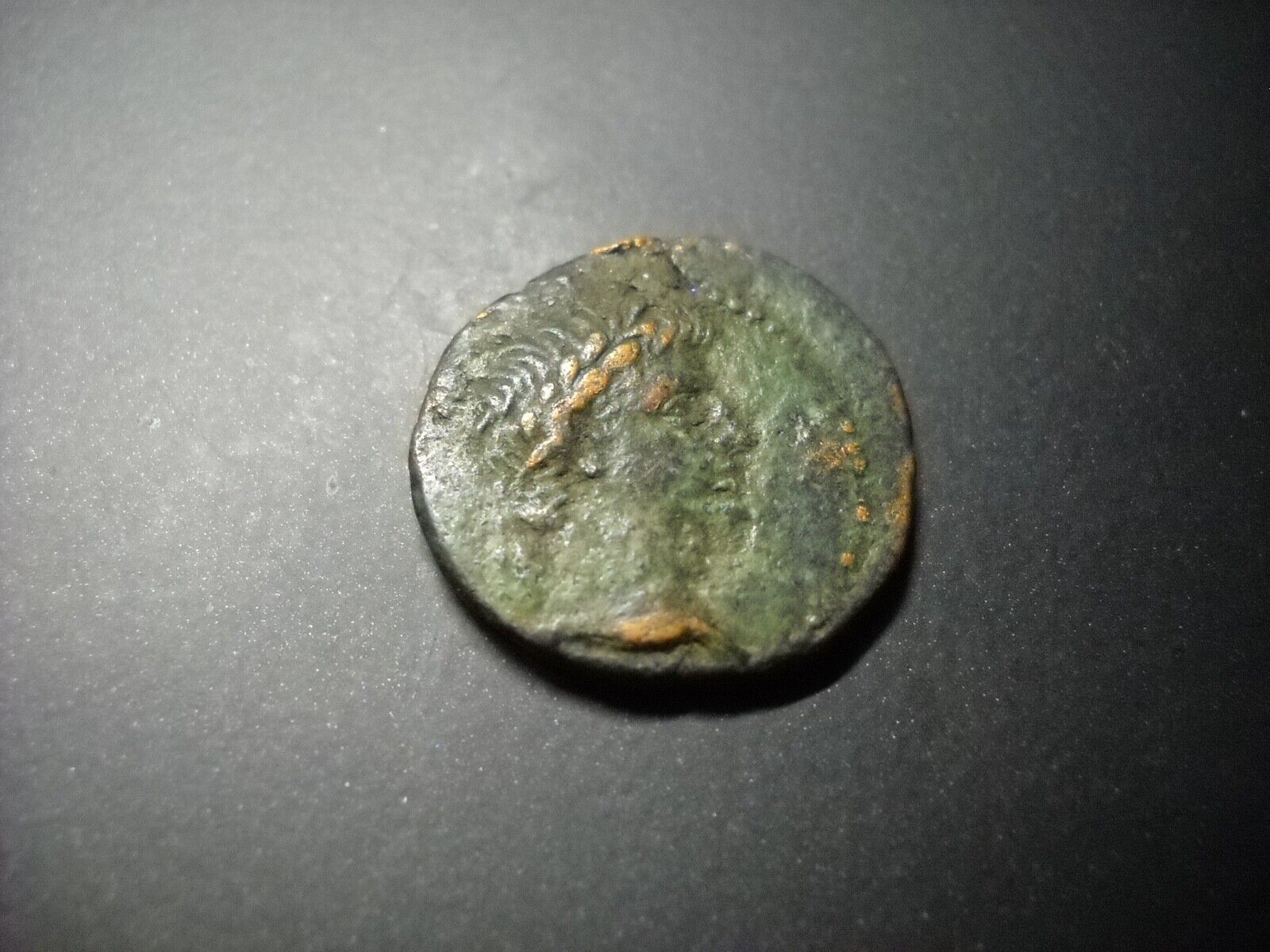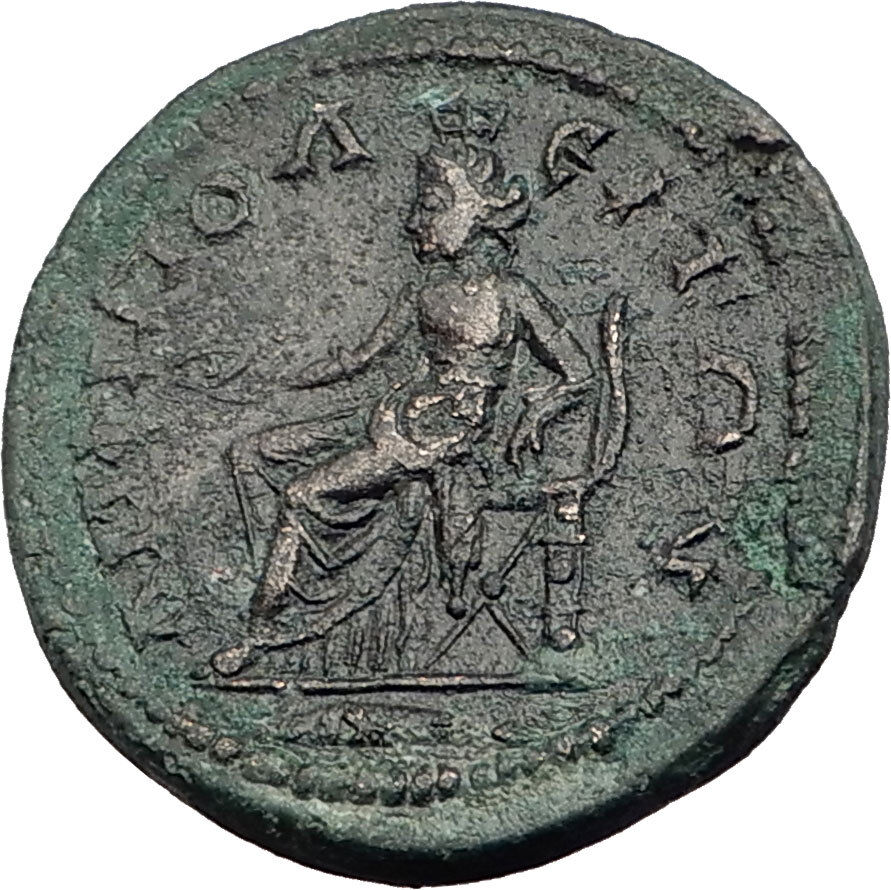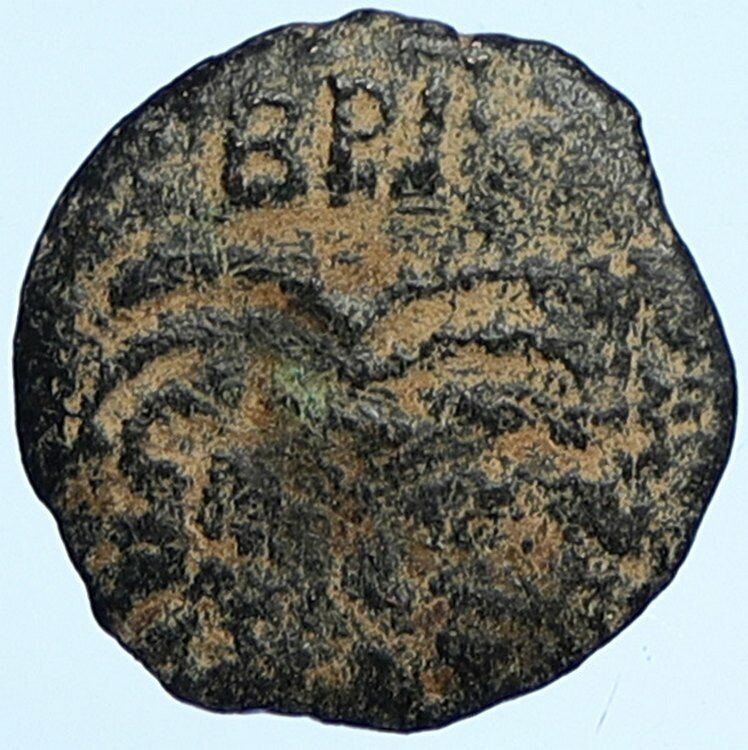-40%
CARACALLA Thessalonica in Macedonia Rare Nike in Triga Ancient Roman Coin i35210
$ 26.4
- Description
- Size Guide
Description
Item:i35210
Authentic Ancient Coin of:
Caracalla - Roman Emperor: 198-217 A.D. -
Bronze 24mm (8.02 grams) of Thessalonica in Macedonia
Reference: Moushmov 6750
AV K M AVP ANTΩNINOC, Laureate, draped, and cuirassed bust right, seen from behind.
ΘЄCCAΛONIKЄΩN, Nike, holding wreath, in galloping triga right; Γ below.
You are bidding on the exact item pictured, provided with a Certificate of Authenticity and Lifetime Guarantee of Authenticity.
The city was founded around 315 BC by the King Cassander of Macedon , on or near the site of the ancient town of Therma and twenty-six other local villages. He named it after his wife Thessalonike , a half-sister of Alexander the Great . She gained her name ("victory of Thessalians": Gk
nikē
"victory") from her father, Philip II , to commemorate her birth on the day of his gaining a victory over the Phocians , who were defeated with the help of Thessalian horsemen, the best in Greece at that time. Thessaloniki developed rapidly and as early as the 2nd century BC the first walls were built, forming a large square. It was an autonomous part of the Kingdom of Macedon , with its own parliament where the King was represented and could interfere in the city's domestic affairs.
Roman era
After the fall of the kingdom of Macedon in 168 BC , Thessalonica became a city of the Roman Republic . It grew to be an important trade-hub located on the Via Egnatia , the Roman road connecting Byzantium (later Constantinople ), with Dyrrhachium (now Durrës in Albania ), and facilitating trade between Europe and Asia. The city became the capital of one of the four Roman districts of Macedonia; it kept its privileges but was ruled by a praetor and had a Roman garrison, while for a short time in the 1st century BC , all the Greek provinces came under Thessalonica (the Latin form of the name). Due to the city's key commercial importance, a spacious harbour was built by the Romans, the famous
Burrowed Harbour
(Σκαπτός Λιμήν) that accommodated the town's trade up to the eighteenth century; later, with the help of silt deposits from the river Axios , it was reclaimed as land and the port built beyond it. Remnants of the old harbour's docks can be found in the present day under Odos Frangon Street, near the Catholic Church.
Thessaloniki's acropolis , located in the northern hills, was built in 55 BC after Thracian raids in the city's outskirts, for security reasons.
The city had a Jewish colony, established during the first century , and was to be an early centre of Christianity . On his second missionary journey, Paul of Tarsus , born a Hellenized Israelite, preached in the city's synagogue, the chief synagogue of the Jews in that part of Thessaloniki, and laid the foundations of a church. Other Jews opposed to Paul drove him from the city, and he fled to Veroia . Paul wrote two of his epistles to the Christian community at Thessalonica, the First Epistle to the Thessalonians and the Second Epistle to the Thessalonians .
Thessaloníki acquired a patron saint, St. Demetrius , in 306. He is credited with a number of miracles that saved the city, and was the Roman Proconsul of Greece under the anti-Christian emperor Maximian , later martyred at a Roman prison where today lies the Church of St. Demetrius , first built by the Roman sub-prefect of Illyricum Leontios in 463. Other important remains from this period include the Arch and Tomb of Galerius , located near the centre of the modern city.
Antoninus (Called 'Caracalla')
Caesar: 195-198 A.D.
Augustus: 198-217 A.D.
( 198-209 A.D. - with Septimius Severus)
( 209-211 A.D. - with Septimius Severus and Geta)
( 211-217 A.D. - Sole Reign)
Caracalla
(April 4, 188 - April 8 , 217. Caracallus ), born
Lucius Septimius Bassianus
and later called
Marcus Aurelius Antoninus
and
Marcus Aurelius Severus Antoninus
, was the eldest son of Septimius Severus and Roman Emperor from 211 to 217. He was one of the most nefarious of Roman emperors. Caracalla's reign was notable for:
the
Constitutio Antoniniana
, granting Roman citizenship to freemen throughout the Roman Empire , according to Cassius Dio in order to increase taxation;
debasing the silver content in Roman coinage by 25 percent in order to pay the legions; and
the construction of a large thermae outside Rome, the remains of which, known as the Baths of Caracalla , can still be seen today
"Caracalla was the common enemy of all mankind," wrote Edward Gibbon . He spent his reign traveling from province to province so that each could experience his "rapine and cruelty."
Caracalla's real name was Marcus Aurelius Antoninus. He got the nickname from his habit of wearing a cloak by the same name. Caracalla was the elder son of Septimius Severus and brother of Geta whom he positively hated. Hated so much, in fact, that he had him murdered a few years later. In the mayhem that followed, Caracalla's men went on a killing spree of anyone suspected of being a Geta sympathizer. In the massacre, it's estimated up to 20,000 people lost their lives. Caracalla would go on to rule for another five years but his bad karma caught up with him and he was assassinated in a plot perpetrated by Macrinus.
As an emperor Caracalla possessed few redeeming qualities and among the worst of them would be his ruinous drain on the treasury. Because he knew everyone hated him he sought the protection of the army. And the surest way of getting this protection was to buy it outright. He raised the pay of the solider to about four denarii per day, nearly quadrupling the salary of just a few years prior. And on top of their regular salary he heaped endless bonuses and other concessions meant to endear them. This money could only have come by the oppressive taxation of ordinary citizens as well as the seizures of property of the wealthy under trumped-up charges. This not only intensified the hatred against him but also had the effect of corrupting the military who had become accustomed to this life of luxury and throwing the economy into lasting disarray.
Rise to power
Caracalla, of mixed Punic /Berber and Syrian Arab descent, was born Lucius Septimius Bassianus in Lugdunum , Gaul (now Lyon, France ), the son of the later Emperor Septimius Severus and Julia Domna . At the age of seven, his name was changed to Marcus Aurelius Septimius Bassianus Antoninus to solidify connection to the family of Marcus Aurelius . He was later given the
Caracalla
nickname , which referred to the Gallic hooded tunic he habitually wore and which he made fashionable.
His father, who had taken the imperial throne in 193, died in 211 while touring the northern marches at Eboracum (York), and Caracalla was proclaimed co-emperor with his brother Publius Septimius Antoninius Geta . However since both of them wanted to be the sole ruler, tensions between the brothers were evident in the few months they ruled the empire together (they even considered dividing the empire in two, but were persuaded not to do so by their mother). In December 211, Caracalla had Geta, the family of his former father-in-law Gaius Fulvius Plautianus , his wife Fulvia Plautilla (also his paternal second cousin), and her brother assassinated. He persecuted Geta's supporters and ordered a
damnatio memoriae
by the Senate against his brother.
Reign
In 213 Caracalla went north to the German frontier to deal with the Alamanni who were causing trouble in the Agri Decumates . The emperor managed to win the sympathy of the soldiers with generous pay rises and popular gestures, like marching on foot among the ordinary soldiers, eating the same food, and even grinding his own flour with them.
Caracalla defeated the Alamanni in a battle near the river Main, but failed to win a decisive victory over them. After a peace agreement was brokered, the senate conferred upon him the title "Germanicus Maximus". In the next year the emperor traveled to the East.
When the inhabitants of Alexandria heard Caracalla's claims that he had killed Geta in self-defense, they produced a satire mocking this claim, as well as Caracalla's other pretensions. Caracalla responded to this insult savagely in 215 by slaughtering the deputation of leading citizens who had unsuspectingly assembled before the city to greet his arrival, and then unleashed his troops for several days of looting and plunder in Alexandria. According to historian Cassius Dio, over 20,000 people were killed.
During his reign as emperor, Caracalla raised the annual pay of an average legionary to 675
denarii
and lavished many benefits on the army which he both feared and admired, as instructed by his father Septimius Severus who had told him to always mind the soldiers and ignore everyone else. His official portraiture marked a break with the detached images of the philosopher-emperors who preceded him: his close-cropped haircut is that of a soldier, his pugnacious scowl a realistic and threatening presence. The rugged soldier-emperor iconic type was adopted by several of the following emperors who depended on the support of the legions, like Trebonianus Gallus .
[11]
Seeking to secure his own legacy, Caracalla also commissioned one of Rome's last major architectural achievements, the Baths of Caracalla , the largest public bath ever built in ancient Rome. The main room of the baths was larger than St. Peter's Basilica , and could easily accommodate over 2,000 Roman citizens at one time. The bath house opened in 216, complete with private rooms and outdoor tracks. Internally it was decorated with golden trim and mosaics.
The Roman Empire and its provinces in 210 AD
Fall
While travelling from Edessa to begin a war with Parthia , he was assassinated while urinating at a roadside near Harran on April 8 , 217 by Julius Martialis, an officer in the imperial bodyguard. Herodian says that Martialis' brother had been executed a few days earlier by Caracalla on an unproven charge; Cassius Dio, on the other hand, says that Martialis was resentful at not being promoted to the rank of centurion. The escort of the emperor gave him privacy to relieve himself, and Martialis ran forward and killed Caracalla with a single sword stroke. He immediately fled on horseback, but was killed by a bodyguard archer.
[
neededcitation
]
Caracalla was succeeded by the Praetorian Prefect of the Guard, Macrinus , who almost certainly was part of the conspiracy against the emperor.
His nickname
According to Aurelius Victor in his
Epitome de Caesaribus
, the cognomen "Caracalla" refers to a Gallic cloak that Caracalla adopted as a personal fashion, which spread to his army and his court. Cassius Dio and the
Historia Augusta
[14]
agree that his nickname derived from his cloak, but do not mention its country of origin.
Caracalla and Geta by Lawrence Alma-Tadema . 1907.
Legendary king of Britain
Geoffrey of Monmouth 's legendary
History of the Kings of Britain
makes Caracalla a king of Britain, referring to him by his actual name "Bassianus", rather than the nickname Caracalla. After Severus's death, the Romans wanted to make Geta king of Britain, but the Britons preferred Bassianus because he had a British mother. The two brothers fought a battle in which Geta was killed, and Bassianus succeeded to the throne. He ruled until he was betrayed by his Pictish allies and overthrown by Carausius , who, according to Geoffrey, was a Briton, rather than the Menapian Gaul that he actually was.
Your browser does not support JavaScript. To view this page, enable JavaScript if it is disabled or upgrade your browser.
Frequently Asked Questions
How long until my order is shipped?:
Depending on the volume of sales, it may take up to 5 business days for shipment of your order after the receipt of payment.
How will I know when the order was shipped?:
After your order has shipped, you will be left positive feedback, and that date should be used as a basis of estimating an arrival date.
After you shipped the order, how long will the mail take?
USPS First Class mail takes about 3-5 business days to arrive in the U.S., international shipping times cannot be estimated as they vary from country to country. I am not responsible for any USPS delivery delays, especially for an international package.
What is a certificate of authenticity and what guarantees do you give that the item is authentic?
Each of the items sold here, is provided with a Certificate of Authenticity, and a Lifetime Guarantee of Authenticity, issued by a world-renowned numismatic and antique expert that has identified over 10000 ancient coins and has provided them with the same guarantee. You will be quite happy with what you get with the COA; a professional presentation of the coin, with all of the relevant information and a picture of the coin you saw in the listing.
Compared to other certification companies, the certificate of authenticity is a -50 value. So buy a coin today and own a piece of history, guaranteed.
Is there a money back guarantee?
I offer a 30 day unconditional money back guarantee. I stand behind my coins and would be willing to exchange your order for either store credit towards other coins, or refund, minus shipping expenses, within 30 days from the receipt of your order. My goal is to have the returning customers for a lifetime, and I am so sure in my coins, their authenticity, numismatic value and beauty, I can offer such a guarantee.
Is there a number I can call you with questions about my order?
You can contact me directly via ask seller a question and request my telephone number, or go to my About Me Page to get my contact information only in regards to items purchased on eBay.
When should I leave feedback?
Once you receive your order, please leave a positive. Please don't leave any negative feedbacks, as it happens many times that people rush to leave feedback before letting sufficient time for the order to arrive. Also, if you sent an email, make sure to check for my reply in your messages before claiming that you didn't receive a response. The matter of fact is that any issues can be resolved, as reputation is most important to me. My goal is to provide superior products and quality of service.
Your browser does not support JavaScript. To view this page, enable JavaScript if it is disabled or upgrade your browser.



